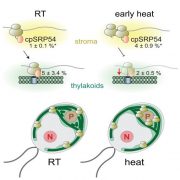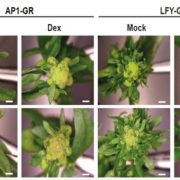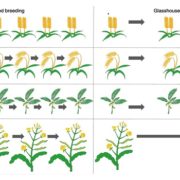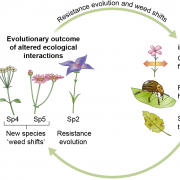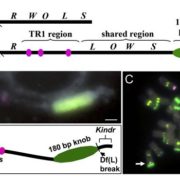Population genomic analysis of mango suggests a complex history of domestication ($) (New Phytol)
Mango trees have been cultivated for approximately 4000 years which places their domestication in the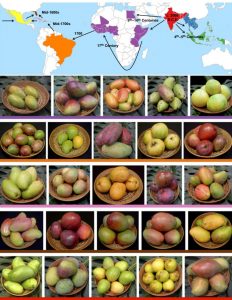 same timeline as that of walnut, peach, sweet orange, lychee, citron, sweet orange, lemon, and jujube. Throughout the process of domestication, most crops undergo severe bottlenecks which decrease genetic diversity. The effects of these bottlenecks have not been extensively studied in perennial species. This work by Warschefsky et al. explores patterns of genetic diversity in mango and adds to the body of knowledge about perennial evolution. SNP markers from double digested restriction site associated DNA sequencing were used to explore geographical patterns of diversity in 158 mango accessions from seven geographical regions. Two distinct gene pools of cultivated mango were identified as germplasm originating from India and Southeast Asia. Interestingly, no significant bottlenecks were found to be associated with the introduction of mango into new regions, suggesting a complex history of domestication. In fact, many measures of genetic diversity were slightly elevated in places where the mango has been introduced including Africa, South America, the Caribbean, and Mexico. This publication was shared to our Plantae Facebook page on May 13, 2019 and quickly went viral. As of this week, this paper has over 372,000 views and 2,412 shares on Facebook. (Summary by Katie Rogers). New Phytol. 10.1111/nph.15731
same timeline as that of walnut, peach, sweet orange, lychee, citron, sweet orange, lemon, and jujube. Throughout the process of domestication, most crops undergo severe bottlenecks which decrease genetic diversity. The effects of these bottlenecks have not been extensively studied in perennial species. This work by Warschefsky et al. explores patterns of genetic diversity in mango and adds to the body of knowledge about perennial evolution. SNP markers from double digested restriction site associated DNA sequencing were used to explore geographical patterns of diversity in 158 mango accessions from seven geographical regions. Two distinct gene pools of cultivated mango were identified as germplasm originating from India and Southeast Asia. Interestingly, no significant bottlenecks were found to be associated with the introduction of mango into new regions, suggesting a complex history of domestication. In fact, many measures of genetic diversity were slightly elevated in places where the mango has been introduced including Africa, South America, the Caribbean, and Mexico. This publication was shared to our Plantae Facebook page on May 13, 2019 and quickly went viral. As of this week, this paper has over 372,000 views and 2,412 shares on Facebook. (Summary by Katie Rogers). New Phytol. 10.1111/nph.15731


